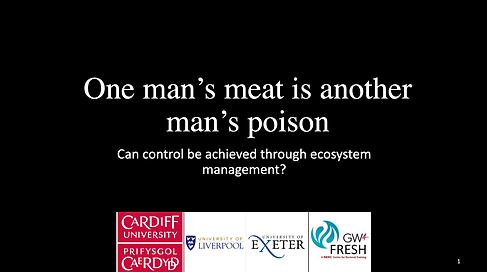BAVP ANNUAL MEETING
8TH - 9TH SEPTEMBER 2022
School of Biological Sciences, Belfast
We’re pleased to announce the next BAVP annual meeting will be held on Thursday 8th - Friday 9th September 2022 at the School of Biological Sciences, Belfast, 19 Chlorine Gardens, BT9 5DL.
The meeting will run in a hybrid format with both in-person and online only attendance options. Registration for attendance will be free of charge for both in-person and virtual attendance. This event will follow on from our very successful virtual ECR meeting in May 2022.
We are now inviting registration and abstract submission to the meeting. There is the option to do a 10-minute oral presentation or 3-minute poster presentation. Note: posters will be presented in an electronic format at this event to reduce paper waste and to make travel easier.
Key dates:
Abstract submission deadline: 1st August 2022
In-person registration deadline: 7th August 2022
Online only registration deadline: 7th September 2022
Meeting: Thursday 8th - Friday 9th September 2022
*Please note that when you register or submit an abstract you will see a confirmation screen confirming your registration but will not receive an email confirmation*
If your organisation would like to sponsor our meeting, please get in touch with Christopher McFarland (c.mcfarland@qub.ac.uk).
Keynote Speakers
Dr Paul McVeigh

Can small RNAs help address the big issues in helminth parasite control?
Wells, D. [1], Wray, C. [1], Herron, C. [1], Morphew, R. [2], Atkinson, L. [1], McVeigh, P. [1]
[1] School of Biological Sciences, Queen’s University Belfast
[2] Department of Life Sciences, Aberystwyth University
Understanding how parasites interact with and survive within their hosts is a key challenge for parasitologists. Much effort is directed towards decoding the parasite “secretome” – the repertoire of molecules secreted by parasites to aid their survival. Helminth parasite secretomes are now known to consist of several RNA species in addition to classically recognised proteins, lipids and sugars. These molecules are essential contributors to parasite-host communication, but also represent potential biomarkers which could contribute to improved detection and diagnosis of parasitic infections. Our team focuses on the secreted micro (mi)RNA component of helminth secretomes, through RNA sequencing of plasma from experimentally- and naturally-infected animals. I will present data from two representative species: Fasciola hepatica, a trematode liver fluke, and Strongyloides ratti, a gastrointestinal nematode. I will present our latest insights from longitudinal plasma miRNA sequencing datasets from both species, from the dual perspectives of how extracellular miRNAs could allow parasites to control host gene expression, and how we might apply these data to improved parasite diagnostics and control.

Dr Rossella Panarese
“What’s the right question?”, that is the question…
Panarese, R. [1]
[1] School of Biodiversity, One Health and Veterinary Medicine, University of Glasgow, G12 8QQ, Scotland, UK
The 21st century may be remembered as the period in which we all had the perception of being constantly under threat. In the last two decades, the importance of global warming has been established, climatic disasters have occurred with increased frequency, and a variety of infectious diseases of man and animals have emerged. In this novel context, the parasitic disease landscape of small animals has changed as well, in terms of epidemiology and distribution, particularly in the case of vector-borne pathogens. Healthcare researchers are progressively embracing the ‘One Health’ approach, using sophisticated modelling to predict the spread of zoonotic vector-borne pathogens and applying a new generation of diagnostic technologies and treatments to both animal and human diseases. While the scientific community is adapting to this unique and complex backdrop, the task remains to identify which new critical questions to address. Since the start of my academic career, I have often asked myself how best to define my research priorities and how to lead a research study with maximal impact. Although I still do not have a definitive answer for these questions, I will relate my experiences as a young scientist in the field of small animal parasitology working with zoonotic, re-emerging vector-borne infectious diseases, sharing how I have attempted to “mind the knowledge gap” in this challenging new era.
Agenda



Student Awards
Winner
Daniel McDowell
One man's meat is another man's poison: Do aquatic micro invertebrates consume fluke free-living stages?
Runners Up
Madeleine Noll
Distribution of ticks in Europe: One model does not fit all.

Philip Best
The emergence of hybrid Fasciolids in central Vietnam.
Kindly sponsored by

